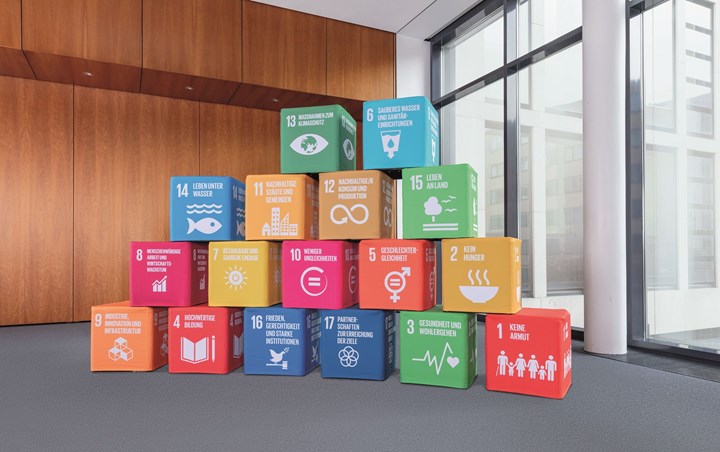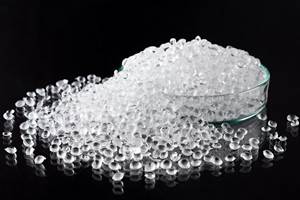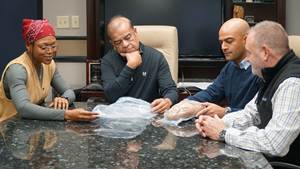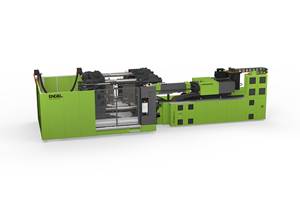State of the Circular Plastics Transition in Europe
VDMA interviewed Dr. Ralf Dussel, Chairman of Plastics Europe Deustchland.
Plastics Europe Deutschland is the German division of the European plastics trade organization. As part of a series of interviews leading up to the K Show, VDMA (the German mechanical engineering trade association) spoke with its chairman, Dr. Ralf Dussel.

The United Nations’ 17 sustainable development goals include industry, innovation & infrastructure (9), responsible production and consumption (12), and climate action (13).
Photo Credit: Plastics Europe Deutschland
Dr. Dussel spoke of the importance of the circular transition, the role of chemical recycling technologies and their regulatory status in Europe, and the important implementation of the principles of design for recyclability. Dr. Dussel advocated for the equal treatment, by the state, of recyclate from chemical and mechanical processes, and predicted that the energy cost of chemical recycling will improve. The full text of the interview, conducted by Ina Vettkotter, is below.
VDMA: Dr. Düssel, the plastics manufacturing industry has done reasonably well to date with a linear economic model, so why the switch to a circular economy?
Dussel: This is the only way to achieve the greenhouse gas reduction and climate neutrality targets that Europe and Germany have set themselves. Our study, Reshaping Plastics – Pathways to a Circular, Climate Neutral Plastics System in Europe, shows that we have already taken some steps in the right direction, but it also shows that our pace is still too slow. The transformation towards climate neutrality needs to happen faster, and circular economy is an important contribution towards this. It helps to reduce waste and lower the use of fossil raw materials. Many of our member companies are already using various sustainable raw materials. There are also already initial examples available of closed material flows. However, this is where we still need to move faster, which is why, as an association, we strongly support the switch from a linear to circular economy.
VDMA: Chemical recycling can make a contribution. How far have you advanced technologically within this field?
Dussel: There are first plants producing pyrolysis oils on a smaller industrial scale. In addition, there are various research projects in Germany and Europe. However, we need to push innovations in this area even further: for example, we need to understand how to deal with different waste streams. In order to do so though, we need an innovation-friendly environment. As an industry, we have made clear investment commitments, investing around 2.6 billion euros in 2025, which will increase to up to 7.2 billion euros by 2030. But in doing so, we need to be certain that the products obtained from chemical recycling will also be recognized as recyclates in regulatory terms.
VDMA: Currently, the EU is considering classifying products from chemical recycling in a different manner to those from mechanical recycling. What would this mean for your industry?
Dussel: That would not be a good development. We support developments that do not favour any particular technology, because we are convinced that neither we in industry, nor the regulators in the EU and Germany know what the world will look like in ten years. That's why we need classification of recycling that is open to any type of technology. Only then can all investments and innovations also be driven forward, so that in the end, the best recycling method for the respective application is used, for example in terms of its climate protection potential. For this reason, we expressly do not support a different treatment of the various recycling techniques.
VDMA: How likely is it that your association’s viewpoint will gain acceptance?
Dussel: I believe we are on the right track. I am very pleased that the topic was taken up in the German coalition agreement, and that chemical recycling is to be included in the legislative act on packaging. We will do everything we can to make this happen.
VDMA: Can you describe which method will have its place and where in the future?
Dussel: It is often argued that chemical recycling is taking market shares away from mechanical recycling; this approach is wrong. We clearly need even more mechanical recycling, and capacities must be significantly expanded here. Chemical recycling comes into play when mechanical recycling reaches its limits: for example, when recycling has been done too often, and the plastic chains have therefore become shorter and shorter, or when we have very mixed waste. A good example is the rotor blades of wind turbines, which are mostly made of fiberglass-reinforced plastic. We need chemical recycling for this purpose, because the mechanical one doesn't render a usable product. With chemical recycling, we can achieve a quality in this field that is comparable to virgin material. This material can be reused in medical products or food applications, for example, and that's exactly why both recycling processes are complementary, and we absolutely need both.
VDMA: Chemical recycling, however, requires a high energy input.
Dussel: New studies show that you have to use five to ten percent of the energy content of the waste for the process of chemical recycling. That means you recover about 70 percent of the carbon atom; that's not bad. Other studies compare the energy requirements of mechanical recycling with chemical recycling. Chemical recycling isn't too bad in that regard either. We are working on further improvements. I am confident that we will also bring chemical recycling up to a decent level in terms of energy consumption – all the more so when the supply of power and heat is sourced from green electricity.
VDMA: What is the role of design-for-recycling in the effort to achieve climate neutrality?
Dussel: That is also an important building block for closing the loop and consequently for achieving greenhouse gas neutrality. There are already many good examples of this: for instance, a recyclable toothbrush or a car seat made from just one material – both of which increase the chances of recovering recyclates from discarded plastic products. We will certainly see many similar examples at K. It just needs to be implemented consistently, and customers and end users need to accept the products. Avoiding waste, reducing waste and reusing products first and foremost, and only then recycling, promoted for example by design-for-recycling, that is the right way to go.
VDMA: Will we eventually be able to do without fossil raw materials altogether?
Dussel: If we close the loops, we will no longer need fossil raw materials. If we then combine that with green energy, it's an enormous step toward achieving greenhouse gas neutrality. However, it won't work without a circular economy.
Related Content
K 2022 Additives & Materials: Sustainability in the Lead
Nearly all of the new additives highlighted at the big show are aimed at enhancing recyclability of commodity resins and some volume engineering resins such as nylon and PC. A few new materials, on which we had not previously reported, also surfaced at K 2022.
Read MoreBreaking the Barrier: An Emerging Force in 9-Layer Film Packaging
Hamilton Plastics taps into its 30-plus years of know-how in high-barrier films by bringing novel, custom-engineered, nine-layer structures resulting from the investment in two new lines.
Read MoreExhibitor Registration Opens for K 2025
Exhibitor registration for the triennial event, which will take place Oct. 8-15, 2025, in Düsseldorf, Germany, is open with a reservation deadline of May 31, 2024.
Read MoreEnergy Efficiency in Focus at K 2022
As much as cycle time, kWh/kg was an oft-cited metric by injection molding machine suppliers at October’s big show.
Read MoreRead Next
Making the Circular Economy a Reality
Driven by brand owner demands and new worldwide legislation, the entire supply chain is working toward the shift to circularity, with some evidence the circular economy has already begun.
Read MoreSee Recyclers Close the Loop on Trade Show Production Scrap at NPE2024
A collaboration between show organizer PLASTICS, recycler CPR and size reduction experts WEIMA and Conair recovered and recycled all production scrap at NPE2024.
Read MoreLead the Conversation, Change the Conversation
Coverage of single-use plastics can be both misleading and demoralizing. Here are 10 tips for changing the perception of the plastics industry at your company and in your community.
Read More






























